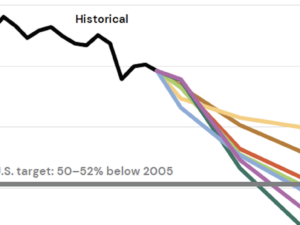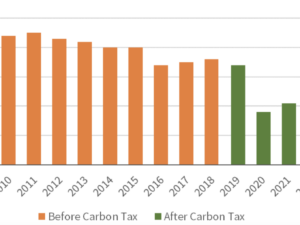By Steve Valk
Recent editorials in two major newspapers are calling on Congress and the Biden administration to include carbon pricing in upcoming legislation to address climate change. The policy endorsements came from the Houston Chronicle and the Washington Post, both of which cited Europe’s ambitious climate plans — including a carbon border adjustment — as motivation for the U.S. to price carbon.
Senate Democrats just rolled out a budget resolution for $3.5 trillion in spending that includes measures to address climate change. Democrats hope to pass the bill through the budget reconciliation process, which requires a simple majority of votes. Not yet included in the budget is a price on carbon, an omission the Chronicle and the Post find glaring.
From the Chronicle:
Biden should seize the moment and adopt the carbon tax idea that Democrats have been fighting for on and off for decades and which now has the blessing of the U.S. Chamber of Commerce, the American Petroleum Institute and a growing, if still too-small, list of Republican lawmakers.
At its core, a carbon tax would impose a fee on coal, natural gas and petroleum, including gasoline and other products, based on how much carbon is released when they are burned. That tax would in most cases be passed onto consumers, and — to varying degrees among the rival bills awaiting hearings in Congress — consumers would be paid a check each year to offset those higher costs…
…Biden has the bully pulpit — and his party leads both chambers of Congress. He should use his fragile advantage to put America back in this race. The clock is ticking.
In its editorial, the Post praised the European Union’s carbon price, currently around 50 euros per ton, as well as plans to compensate households for higher energy bills:
Pricing carbon dioxide is the cheapest, most efficient way to cut emissions, because it harnesses the ingenuity of individuals and businesses to find the best path to decarbonization. To offset consumers’ higher energy costs, the E.U. would offer them potentially tens of billions of dollars in aid, derived from the revenue the carbon tax would generate. To keep industries from leaving Europe for nations with lower carbon taxes, the E.U. would impose a carbon border adjustment — a tariff on goods from countries that lack stringent emissions policies of their own.
The Post went on to say the U.S. should follow Europe’s lead on carbon pricing:
What is clear is that [Europe’s] basic outline — price emissions, recycle the revenue back to consumers, impose a border adjustment — is the most rational policy response to climate change.
U.S. leaders should embrace it, too. Instead, Republicans mostly stick their heads in the sand. Democrats want to act, which is an improvement, but they appear to favor setting mandates and spending massive amounts of money, rather than pricing carbon. They should rethink this approach. Imposing a carbon tax would raise revenue, cut emissions and cost less than mandate and subsidy programs. A bonus is that it would be clearly kosher under the complex Senate “reconciliation” rules Democrats need to honor to dodge a Republican filibuster.
The significance of these editorials can’t be overstated. The Post, the paper of record in our nation’s capital, has major impact on public opinion. Houston is considered the energy capital of the world, and the Chronicle’s opinion carries considerable weight. As Congress works on climate legislation in the weeks ahead, we hope to see more newspapers around the country expressing similar support for a price on carbon.






